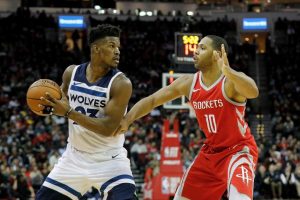By Liam McKeone

Head coach Tom Thibodeau and the Minnesota Timberwolves shocked the basketball world by acquiring Jimmy Butler from the Chicago Bulls on draft night. The Wolves trading for Butler wasn’t the shock, but rather how little they had to give up to get him. For a player considered a perennial All-Star, a regular on the All-NBA defensive team lists and one of the best leaders in the NBA, they only had to give up: Kris Dunn, a former top-ten pick who didn’t seem to be thriving in Minnesota; the No. 7 overall pick (which became Lauri Markannen) and Zach LaVine. Two top-ten picks and LaVine may sound like a lot, but LaVine is coming off a torn ACL and Markannen’s ability to survive in the NBA defensively was a big question mark, while Dunn’s first year in Minnesota was all but a complete waste. The Wolves were ready to win now, and bringing Jimmy Buckets to Minneapolis showed the league where their mind was at. It took the team’s new stud a while to adjust, but now that he knows what he has to do, it’s making all the difference for the surging Wolves just before the All-Star break.
Through his first 12 games, Butler was struggling to find his place. He led by example on the defensive end, but it wasn’t affecting the rest of the Wolves’ generally abysmal defense. Offensively, he worked on getting other guys their shots, dumping the ball to Karl Anthony-Towns in the post or letting Andrew Wiggins go to work on an iso. However, this led to both lower numbers than we’ve come to expect from Butler and nowhere near the jump from the supporting cast in Minnesota. In his first 12 games, Butler averaged only 15 points a game with a shockingly low FG percentage, and while the Wolves went 7-5 over this span, they let up over 100 points eight times – a sacrilege in Thibodeau’s regime. Butler isn’t the first star to initially struggle in a new environment, but Thibodeau, the fans and the team all expected to start winning.
Start winning they did, thanks to an uptick in every category from Butler. He continued to help the defensive progression of the physically talented but inconsistent array of stars he has around him, but his biggest jump came on offense. He stopped worrying about everything else and just did what Jimmy G. Buckets does best: get buckets. As we close in on the All-Star break, Butler is now averaging a line of 21 points, five assists, five rebounds and two steals per game with an effective field goal percentage of over 50 percent, and the Wolves have won 14 out of their last 20 games and sit in the top five of the Western Conference at 30-18. The Wolves still have their problems with the effort their younger players bring on a nightly basis, and Thibodeau’s infamous refusal to spread the minutes around from his star players is a major one. But for the first time in a long time, basketball is good in Minnesota, and Jimmy Butler is the reason why.



































































































































































































